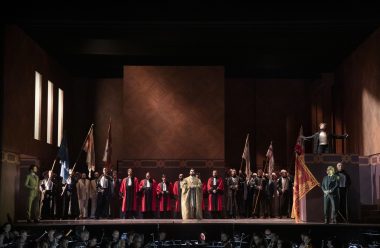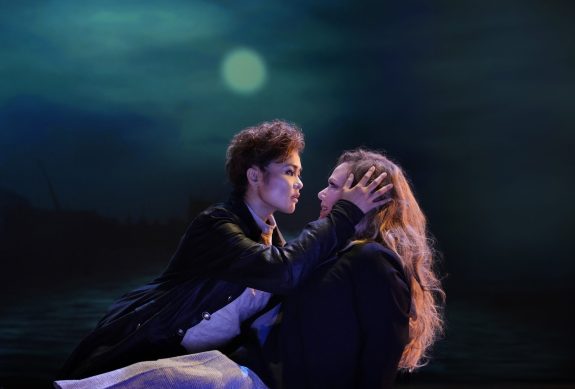
 Italy Rossini Opera Festival 2024 [1] – Rossini, Bianca e Falliero: Soloists, Coro del teatro ventidio basso, Orchestra sinfonica nazionale della RAI, Roberto Abbado (conductor). Auditorium Scavolini, Pesaro, 7.8.2024. (AB)
Italy Rossini Opera Festival 2024 [1] – Rossini, Bianca e Falliero: Soloists, Coro del teatro ventidio basso, Orchestra sinfonica nazionale della RAI, Roberto Abbado (conductor). Auditorium Scavolini, Pesaro, 7.8.2024. (AB)

Production:
Director – Jean-Luis Grinda
Set designs and Costumes – Rudy Sabounghi
Lighting – Laurent Castaingt
Chorus director – Giovanni Farina
Cast:
Doge Priuli – Nicolò Donini
Contareno – Dmitry Korchak
Capellio – Giorgi Manoshvili
Falliero – Aya Wakizono
Bianca – Jessica Pratt
Constanza – Carmen Buendía
Officer/ Usher – Claudio Zazzaro
Chancellor – Dangelo Díaz
Since its foundation in 1976, the Rossini Opera Festival in Pesaro has performed wonders in promoting and re-evaluating the works of Gioachino Rossini. Over the years, it has staged productions of all his 39 operas and initiated new critical editions through the Fondazione Rossini. In terms of what a music festival dedicated to a single composer can achieve in advancing the understanding and critical debate of their oeuvre, the ROF undoubtedly stands alongside the Bayreuth Wagner and Göttingen Handel festivals.
This year’s opening production of Bianca e Falliero – o sia Il consiglio dei tre (Bianca and Falliero, or The Council of Three) in the newly renovated Auditorium Scavolini perfectly illustrates this point. Even among Rossini enthusiasts, it must be one of the least seen or heard of his opere serie. Composed for and first performed at Milan’s La Scala on 26 December 1819, it was the 27-year-old composer’s fourth opera that year, following Ermione, Eduardo e Cristina, and – most notably – La donna del lago, from which Bianca borrows the modified finale. Despite its original run of 39 performances – one of the longest for any Rossini opera – the work quickly fell into obscurity. Only a few numbers become popular in concert performances, and so Bianca remained largely forgotten until it was revived in Pesaro in 1986, with a second production in 2005.
The plot of Felice Romani’s libretto is a typical opera seria mix of love, politics, and family drama, set during Venice’s seventeenth-century war with Spain. Contareno, second only to the Doge in power, tries to force his daughter Bianca into marrying the nobleman Capellio to end a family feud and secure his own social status. But Bianca’s heart belongs to the victorious and dashing general Falliero, who is forced to flee their secret rendezvous to the neighbouring garden of the Spanish ambassador. Venetian martial law deems this an offence punishable by death, but just before his execution, Bianca appears before the Council of Three to reveal the true circumstances. In a moving turn of events, it is Falliero’s rival Capellio who takes a stand against the unhuman law and convinces Contareno to abandon his fierce opposition to the lovers’ union.
As director Jean-Louis Grinda emphasises in his production notes, ‘the historical period of the story is of marginal importance’ to him. Video projections of original black-and-white film footage showing civilians fleeing war-torn cities, along with the costumes seem to place the action in the 1930s. However, these are the only historic or contextual cues. Instead, Grinda focuses on allowing the inner workings of the music to take centre stage, concentrating on the range of emotions experienced by each character.
Rudy Sabounghi’s set design, supported by Laurent Castaingt’s lighting, aligns with this approach. The set comprises a large number of wood-panelled boxes of varying sizes that, Jenga-like, are regularly moved and rearranged on the open stage to create abstract representations of the various Venetian interiors where the action takes place.
While this creates at times some striking visual compositions, it also limits character interaction, often leaving the performers static, with some scenes feeling more like posed tableaux than dynamic drama. Even the chorus (the excellent Coro del Teatro Ventidio Basso led by Giovanni Farina) seems often merely decorative than actually engaged in the action.
A curious addition is an elderly woman walking with a cane who shadows Bianca in most scenes, casting disapproving glances at her actions. Is she an older version of Bianca? Her mother? A symbol of foreboding that the end is not as happy as advertised? The production offers no clear answers, leaving the audience to puzzle over her role. Yet, whatever ambiguities the staging presents are easily eclipsed by the evening’s outstanding musical performances.

Jessica Pratt’s Bianca is nothing short of a triumph. Her coloratura passages are never mere displays of virtuosity; they subtly convey the torment of a soul torn between filial duty and love for Falliero. She demonstrates her mastery of the high and ultra-high register with apparent ease, always using it as a means of expression rather than an end in itself, as supremely demonstrated in the final rondo.
In Aya Wakizono’s Falliero, Pratt has found an ideal counterpart. Wakizono beautifully portrays the heroic pride and inner turmoil of this en travesti role. Her mezzo-soprano is bright and lyrical, effortlessly navigating the coloratura passages and adding a deep sensuality to the Act I duet with Bianca, ‘Sappi che un Dio crudele’, which is a pure pleasure to hear.
Dmitry Korchak as Contareno likewise delivers with confidence, handling the high notes with aplomb and being particularly compelling in the lyrical sections. His rendition of ‘Pensa che omai resistere’, one of the trickiest coloratura pieces Rossini ever wrote for tenor, is a testament to his skill.
Finally, Giorgi Manoshvili completes this set of outstanding vocal performances, bringing a profound humanity to Capellio with his beautifully resonant bass. Thanks to this combination of exceptional singers the Act II quartet ‘Cielo, il mio labro ispira’ emerged as the musical and emotional highlight of the evening, as it rightly should be.
The onstage excellence was matched in the pit by Roberto Abbado, leading the superb Orchestra Sinfonica Nazionale della RAI. His tempi and intelligent reading of Rossini’s intricately elaborate score were outstanding, as were the recitatives beautifully rendered with cello (Jacopo Muratori) and double bass (Matteo Magigrana), alongside the fortepiano (Andrea Severi).
In sum, the exceptional quality of the music making makes an excellent case for Bianca e Falliero to find its way into the repertoire, though it deserves a more engaged and vivid direction in future.
Andreas Bücker